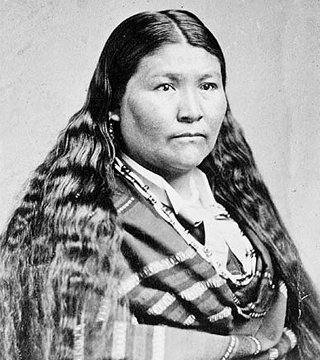
Winema, also known as Kaitchkona Winema ("strong-hearted woman"); Toby Riddle; Tobey Riddle; Nan-ook-too-wa ("strange child") became somewhat of a celebrity on the East Coast for her dedication and commitment in being an interpreter and peacemaker before, during and after the Modoc War of 1872-1873 near Tulelake, CA. She and her white settler husband, Frank Riddle, were instrumental in convincing the Klamath and Modoc tribes to resettle at a reservation in Southern Oregon near present-day Fort Klamath instead of fighting the US Government over claims on their native lands in Northern California and Southern Oregon. Unfortunately, bloodshed couldn't be fully prevented and a number of Modoc Indians, one of them, the infamous 'Captain Jack' (and also Winema's cousin) took shelter in the Lava Beds near Tulelake, CA which resulted in a contingent of the US Army arriving and waging war against Captain Jack and a small band of his followers who were holed up in rocky lava cliffs that lasted for almost a year.
The following verbiage on the Historical Marker reads:
IN MEMORY OF
WINEMA, MODOC HEROINE
INTERPRETER FOR PEACE COMMISSION
PENSIONED BY CONGRESS FOR COURAGEOUS
AND LOYAL SERVICE - MODOC WAR, 1872-3.
----
PRESENTED BY WINEMA CHAPTER
PLACED BY EULALONA CHAPTER
DAUGHTERS OF THE AMERICAN REVOLUTION
MAY 30, 1932
The following text from the Facts on File website gives a good historical account of Winema and some of her accomplishments in life:
Winema was born along the Link River in northern California. Because of the reddish-brown cast to her hair, she was originally called Nan-ook-too-wa, meaning "strange child." She earned the name Winema, for "strong-hearted woman," as a young girl when she safely guided her canoe through rapids and rocks. She gained the further respect of her people when, as a girl of 14, she rallied Modoc to victory after a surprise attack by another tribe. Winema's father Se-cot took her with him to trading posts, at which time she began mastering the English language.
When 15, Winema refused to marry the Modoc husband chosen for her in favor of a Kentucky miner named Frank Riddle. They settled on a ranch together, and she became known to non-Indians as Toby Riddle. Although her tribe at first rejected her, they later called on her and her husband to act as interpreters in negotiations with whites. On several occasions, she helped defuse tense situations and prevent violence. She helped negotiate the Treaty of 1864.
In 1872, after the Modoc under Captain Jack had departed the Klamath Reservation in Oregon for their ancestral lands along the Lost River in California, Winema traveled to their camp to convince her cousin to return to Oregon, where he could safely lobby for a Lost River reservation. Captain Jack reportedly accused her of being a white woman and of being dead to the Modoc.
In the various negotiations that followed, Winema and Frank Riddle acted as interpreters and message-bearers between governmental officials and the Modoc insurgents, coming and going between the army camp and the chiefs in their natural stronghold, the lava beds along Tule Lake.
In February 1873, after extensive fighting, a peace commission was established, including General Edward Richard Sprigg Canby, Alfred B. Meacham, and Eleasar Thomas, and a tent was set up on neutral ground. At the first parley, Captain Jack asked for the lava beds as a reservation and refused to turn over Hooker Jim for the killing of ranchers. Before the second parley, Winema told Meacham that some among the rebels wanted Captain Jack to kill Canby. Although Meacham was concerned, Canby ignored the warning and went ahead with the planned meeting in April. As feared by Winema, Captain Jack drew a hidden revolver and shot and killed Canby; another warrior, Boston Charley, killed Thomas. Schonchin John fired on Meacham, striking him, but Winema threw herself in front of him to protect him. As Schonchin John began to scalp him, Winema called out that soldiers were coming. After the Modoc had fled, she wrapped Meacham in her saddle blanket and set out for help. During the next weeks, when fighting raged once again, Winema nursed the wounded Meacham back to health. He would later write Wi-Ne-Ma (The Woman-Chief) and Her People (1876).
For her act of courage, Winema became a celebrity in the East. She traveled to Washington, D.C., where a parade was held in her honor and where she met President Ulysses S. Grant. From 1874 to 1881, she toured eastern cities with Meacham, her husband, their son Jeff, Scarfaced Charley, and other Modoc, playing herself in the dramatic presentation of Indian issues.
Winema returned to Oregon for the remainder of her life. In 1890, she was granted a pension by the federal government, most of which she donated to her people. Her son by Frank Riddle, Jeff Riddle, used her as an informant for his book, The Indian History of the Modoc War, published in 1914. Winema died on the reservation and was buried in the Modoc Cemetery. A national forest is named after her.
Here are a couple of more links to read more about Winema: Wikipedia and National Archives
Winema is buried next to her husband, Frank Tazewell Riddle, who also bears a memorial plaque on his headstone.